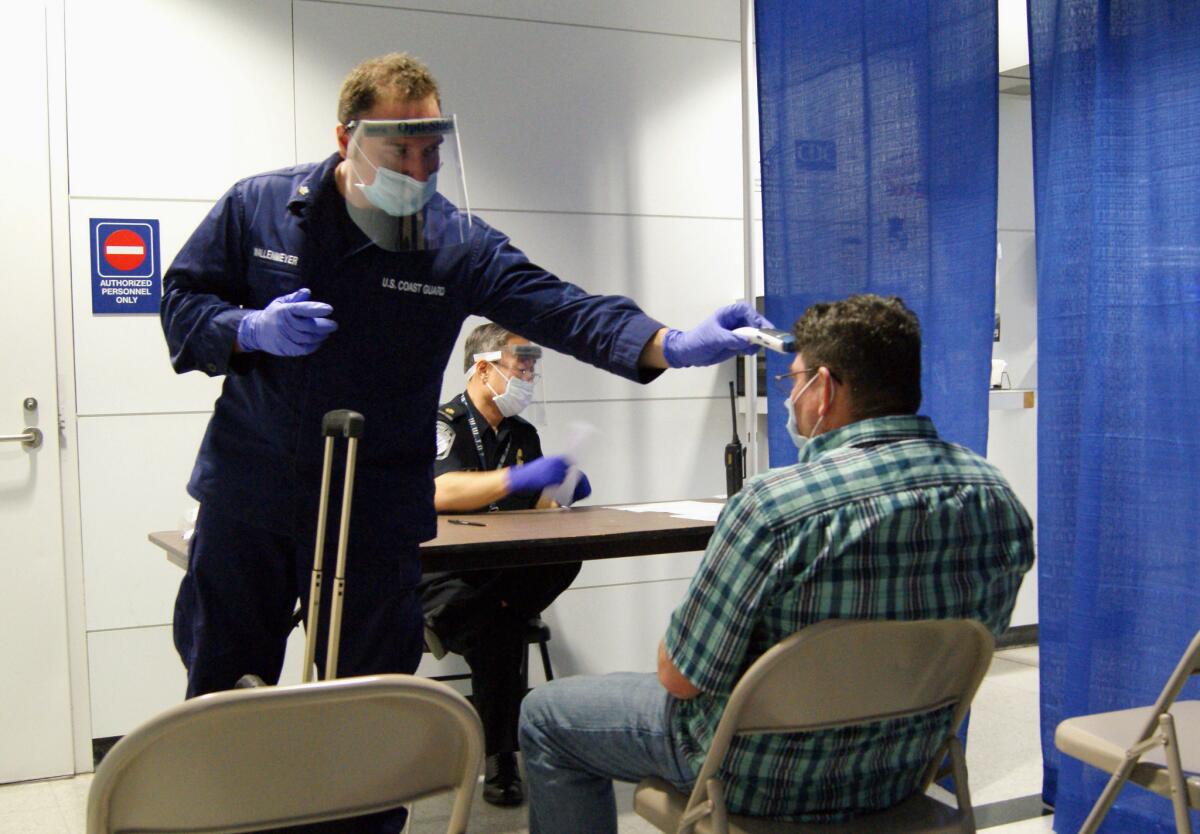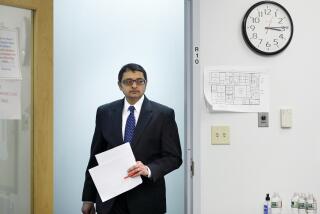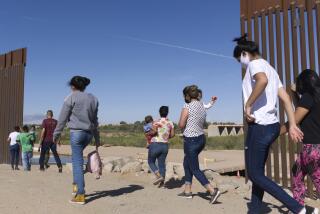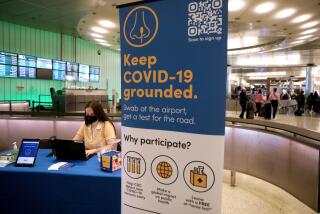U.S. takes more steps to guard against new Ebola cases

- Share via
Reporting from Washington — Pressed to tighten border screening for travelers potentially exposed to Ebola, federal health officials took more steps Wednesday to monitor people coming into the United States from the three West African countries at the center of the outbreak.
Starting Monday, travelers who were in Liberia, Sierra Leone or Guinea will be required to take their temperature daily and report to local health officials in the U.S. for three weeks, the maximum period after exposure to Ebola in which symptoms can appear.
Travelers will be asked to provide contact information and may be subject to travel restrictions, the federal Centers for Disease Control and Prevention said.
They also will be given kits at the airport where they arrive, including a thermometer, a log book for recording temperatures and information on identifying potential Ebola symptoms. If a traveler does not check in with the local health department, authorities will take immediate steps to find the person, according to the CDC.
“This is another step to protect families, communities and healthcare workers from Ebola,” Dr. Thomas Frieden, director of the CDC, said Wednesday. “What we are doing is putting in multiple levels of checks.”
The step is the latest by the Obama administration as it tries to ease public concern and combat criticism that it was slow to respond to the virus threat.
Federal officials already are trying to screen the 150 or so people a day who come to the U.S. from the three West African countries. At the airports where passengers from those countries are permitted to arrive — in Atlanta, Chicago, Washington, New York and Newark, N.J. — officials are taking the travelers’ temperatures and looking for other possible Ebola symptoms, including vomiting, headaches, muscle aches and diarrhea.
The vast majority of travelers haven’t shown symptoms, although several people have been taken to hospitals. Thus far, all have been determined to be Ebola-free, according to a CDC official.
Frieden said this was expected to continue. “With both airport screening and post-arrival monitoring, we expect there to be a steady stream of people with some symptoms who are found not to have Ebola. That’s an example of the system working,” he said.
Local public health officials in New York, Pennsylvania, Maryland, Virginia, New Jersey and Georgia — where the CDC said about 70% of travelers from the African nations are headed — are to begin the so-called active monitoring first. Other states are expected to follow.
Dr. Georges C. Benjamin, head of the American Public Health Assn., called the new step an “elegant solution,” noting that public health departments are familiar with this kind of monitoring and shouldn’t be overly burdened since the number of travelers is relatively low.
Even with the new screening, Frieden and other public health officials emphasize that containing the Ebola outbreak in West Africa is the only way to ensure that there are no more cases in the U.S.
Since the outbreak began in December, there have been more than 9,900 suspected or confirmed cases, with more than 4,800 deaths, almost all in Africa.
Separately, the family of Amber Vinson, one of the Dallas nurses who contracted Ebola while caring for Liberian Thomas Eric Duncan, said she had been cleared of the virus.
“We all know that further treatment will be necessary as Amber continues to regain strength, but these latest developments have truly answered prayers and bring our family one step closer to reuniting with her at home,” Vinson’s mother, Debra Berry, said in a statement.
President Obama said Wednesday that he was more optimistic about the Ebola situation in the U.S., noting that Nigeria and Senegal had been declared Ebola-free and telling reporters that, with a good public health program, “this outbreak can be stopped.”
He noted that relatives of Duncan, the only person to die of Ebola in the U.S., had been released from confinement.
“It just gives people one more sense of how hard it is to get Ebola,” Obama said. “This is not airborne.”
His remarks came after his first White House meeting with Ron Klain since the Democratic troubleshooter was appointed to coordinate the administration’s response to Ebola.
Also Wednesday, the National Institutes of Health announced that human testing had begun on a second experimental Ebola vaccine, VSV-ZEBOV.
The vaccine, developed by the Public Health Agency of Canada, uses a genetically altered version of a virus that usually affects livestock and causes mild illness in humans. In tests with monkeys, the vaccine was shown to produce antibodies to the Ebola virus.
Last month, Phase 1 safety trials began on another vaccine candidate developed by the National Institute of Allergy and Infectious Diseases and drug maker GlaxoSmithKline. Initial safety and immune response results for that vaccine are expected by the end of the year.
Times staff writer Monte Morin in Los Angeles contributed to this report.
More to Read
Sign up for Essential California
The most important California stories and recommendations in your inbox every morning.
You may occasionally receive promotional content from the Los Angeles Times.











